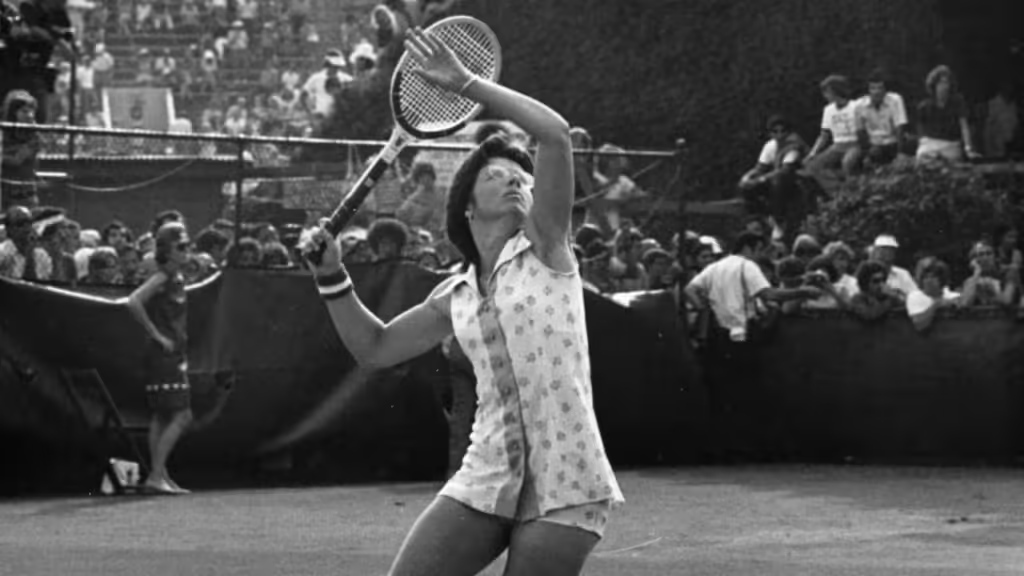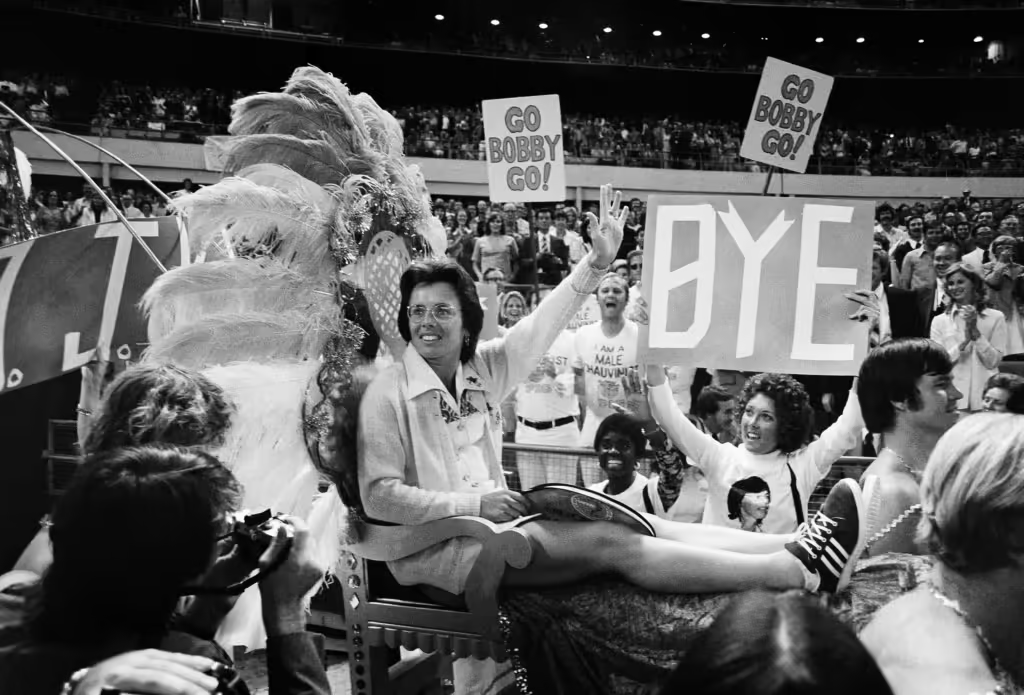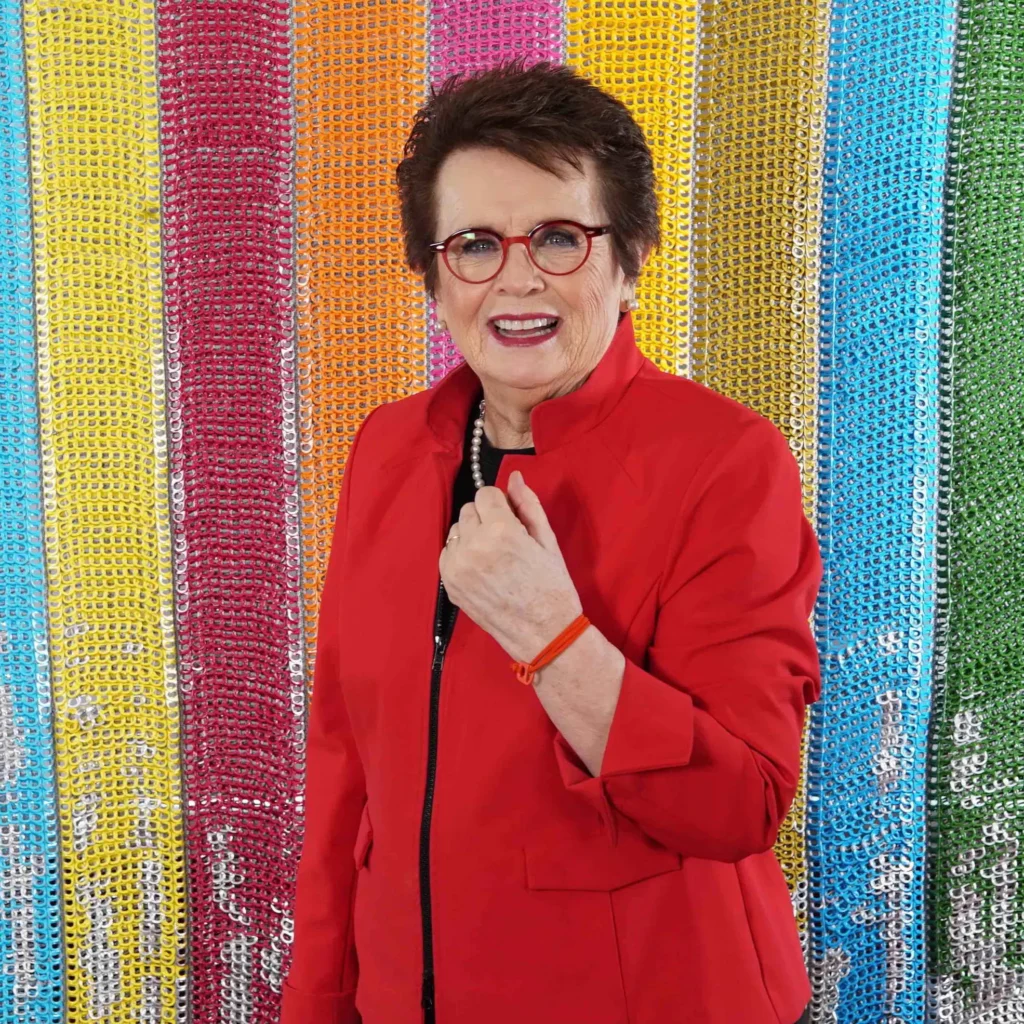Billie Jean King was born on November 22, 1943, in Long Beach, California, as the eldest of four children in a modest middle-class family. Her parents, Bill and Betty, played a significant role in shaping her character and instilling in her the values of hard work and determination. Growing up, King was naturally active and showed an early affinity for sports, particularly tennis, which she would ultimately pursue with great passion. This initial exposure to athletics set a strong foundation for her future career in professional sports.
King’s childhood unfolded against a backdrop of traditional gender roles prevalent in the mid-20th century. During this time, societal expectations often limited women’s opportunities in sports and other fields. However, King was undeterred by the prevailing norms. Significant moments in her youth, such as winning her first tournament at just 11 years old, highlighted her burgeoning talents and foreshadowed her future as a significant figure in the realm of athletics.
Moreover, her family dynamics played a crucial role in her formative years. Billie’s father, an accomplished amateur athlete, introduced her to various sports, which fostered her competitive spirit. In contrast, her mother’s encouraging yet cautious approach balanced Billie’s ambitions, providing her with both support and a realistic perspective on the challenges she would face as a female athlete. The smaller local tennis courts where she practiced daily became the crucibles for her remarkable skills, honing her tenacity and resilience.
These early experiences not only ignited Billie Jean King’s passion for tennis but also nurtured her desire to challenge societal norms. As she navigated her teenage years, the socio-political environment began to shift, creating fertile ground for activism, which would later become an integral part of her identity. King’s childhood was not merely about developing her tennis prowess; it was about laying the groundwork for her future role as a champion for equality in sports and beyond.

Rise to Fame in Tennis
Billie Jean King’s ascent to fame in the world of tennis is marked by numerous significant achievements that not only showcase her skill but also highlight her role in transforming the sport. Having turned professional in 1963, King quickly emerged as one of the leading figures in women’s tennis. Her commitment to the sport bore fruit as she captured a total of 39 Grand Slam titles, including a remarkable 12 singles titles. Among her most notable victories were her triumphs at Wimbledon, where she first secured the women’s singles title in 1966, and then successfully defended it in subsequent years, notably winning in 1968, which marked the tournament’s inaugural year for open competition.
King’s playing style was characterized by an aggressive approach and impressive athleticism. Known for her powerful forehand and strategic serve-and-volley game, she excelled on both grass and hard courts, becoming an expert at reading her opponents. This combination of physical prowess and tactical intelligence contributed to her success, particularly during the 1970s, when she faced tough competition from rivals such as Margaret Court and Chris Evert. The intensity of these rivalries galvanized interest in women’s tennis, leading to increased visibility for female athletes.
King’s contributions extended beyond her individual performances. By advocating for equitable prize money and increased media coverage for women’s tennis, she played a pivotal role in popularizing the sport among wider audiences. Her iconic match against Bobby Riggs in 1973, often referred to as the “Battle of the Sexes,” transcended tennis, elevating discussions around gender equality in sports. Billie’s tenacity and trailblazing achievements laid the foundation for future generations, ultimately making her a symbolic figure in the fight for equality within the realm of athletics.




The Battle of the Sexes
The “Battle of the Sexes,” a historic tennis match that took place on September 20, 1973, between Billie Jean King and Bobby Riggs, remains one of the most significant moments in sports history. This event held far more meaning than merely showcasing athletic prowess; it emerged as a powerful cultural statement in a time when gender norms were being heavily scrutinized. Riggs, a former tennis champion, famously claimed that he could defeat any female player, suggesting the inherent superiority of male athletes. In response, King, not just a formidable player but also a passionate advocate for women’s rights, agreed to face him in a match that would draw worldwide attention.
The match was held at the Houston Astrodome and watched by an estimated 50 million viewers, reflecting its immense cultural significance. King’s victory over Riggs, with a decisive score of 6-4, 6-3, 6-4, served as a symbol of empowerment for women, challenging the prevailing stereotypes that diminished female athletes’ capabilities. By triumphing in such a public arena, King effectively redefined the perception of women’s sports. The match acted as a crucial catalyst for advancing women’s sports in more ways than one. It sparked discussions surrounding gender equality, advocating for equal pay and recognition for female athletes, issues that resonate even today.
King’s unparalleled confidence, marked by her conviction that women deserved equal opportunities in sports and life, positioned her at the forefront of the feminist movement within athletics. Her efforts inspired future generations of female athletes to persevere against societal limitations, emphasizing that gender should not determine one’s capabilities. The “Battle of the Sexes” was not merely a match; it was a landmark event in the ongoing fight for gender equality, positioning King as an enduring symbol of progress and transformation within the realm of sports and beyond.

Advocacy for Women’s Sports
Billie Jean King has been a pivotal figure in the advocacy for women’s sports, working tirelessly to ensure that female athletes receive the recognition, resources, and opportunities they deserve. Her efforts have profoundly shaped the landscape of sports, promoting gender equality and ushering in a new era for women in athletics. One of her most significant contributions was co-founding the Women’s Tennis Association (WTA) in 1973. This organization was essential in providing a structured professional environment for female tennis players, advocating for equal prize money and better working conditions. Under her leadership, the WTA became a powerful entity that championed women’s rights in sports.
King’s influence extended beyond the realm of tennis; her commitment to fostering equality led her to become a leading voice for the passage of Title IX legislation in 1972. Title IX was groundbreaking, prohibiting sex-based discrimination in federally supported education programs, including sports. The enactment of this law played a crucial role in significantly increasing women’s participation in athletics at all educational levels, changing the trajectory of women’s sports in the United States. King’s relentless pursuit of equity allowed countless young female athletes to access opportunities that had previously been denied. She understood that achieving equality in sports was not just about equal pay; it encompassed fostering an inclusive environment where women could thrive and compete.
Through her advocacy, King has inspired generations of female athletes to fight for their rights and advocate for their needs. Her activism exemplifies the intersection of sports and social justice, demonstrating that the fight for equality transcends the playing fields and remains vital in reshaping society. The principles she laid down continue to resonate, reminding society of the importance of equitable treatment for women in sports and beyond.

Fighting for LGBT Rights
Billie Jean King’s legacy extends far beyond her achievements on the tennis court; she has also been a staunch advocate for LGBT rights, utilizing her platform to engage in meaningful dialogue about equality and acceptance. Her courageous journey began during a time when being openly gay was not just frowned upon, but often led to personal and professional consequences. In 1981, King came out as a gay woman, embracing her identity at a time when such revelations could have threatened her career and reputation. This act of defiance placed her at the forefront of a movement that encouraged acceptance and support for the LGBT community.
King’s commitment to fighting for LGBT rights did not stop with her personal revelation. She actively sought to uplift the voices of marginalized individuals through various initiatives. One of her most significant contributions was the co-founding of the Women’s Sports Foundation, an organization dedicated to promoting gender equality and providing resources and opportunities for female athletes. King’s leadership in this foundation has been instrumental in breaking down barriers, allowing women, including those from the LGBT community, to thrive in sports.
Moreover, Billie Jean King has participated in numerous social justice initiatives aimed at advocating for LGBT rights. She has spoken at various events and conferences, lending her voice to the struggle for equality. By aligning herself with the LGBT community, she has inspired countless individuals to embrace their identities and fight for their rights. King’s tenacity and willingness to confront societal norms have made her a respected figure not only in sports but also in the broader movement for LGBT rights. Her efforts continue to resonate, reminding us of the importance of advocacy and solidarity in the ongoing fight for equality.


Legacy in Sports and Beyond
Billie Jean King’s legacy transcends the boundaries of sports, making significant contributions to both athletics and social justice. As a pioneering athlete, she not only redefined the landscape of women’s tennis but also championed the rights of women and the LGBTQ+ community. King’s unwavering commitment to gender equality and inclusion has paved the way for countless female athletes pursuing their dreams in sports and beyond.
Through her established foundations and various initiatives, King has been instrumental in promoting equal opportunities in sports. Her famous victory over Bobby Riggs in the 1973 “Battle of the Sexes” reinforced her position as a trailblazer, inspiring future generations of female athletes to challenge societal norms. Notably, prominent figures such as Serena Williams and Maria Sharapova have publicly acknowledged King’s influence on their careers, showcasing the direct impact she has had on the modern female athlete’s mindset.
King’s accomplishments extend beyond her athletic prowess. She has received numerous honors, including the Presidential Medal of Freedom, the BBC Sports Personality of the Year Lifetime Achievement Award, and the Arthur Ashe Courage Award. Each acknowledgment serves as a testament to her enduring influence in sports, social justice, and advocacy for LGBTQ+ rights.
The impact of Billie Jean King’s legacy is also evident in the establishment of the Women’s Sports Foundation, which continues to empower women through sports participation. King’s work has inspired initiatives like equal pay campaigns, further proving that her impact is both substantial and far-reaching. By advocating for policies that promote equality, she has solidified her role not only as a sports icon but also as an essential figure in the fight for equal rights.
In conclusion, Billie Jean King’s legacy in sports and her profound influence on social justice exemplify her formidable spirit and dedication to equality. Her enduring contributions will undoubtedly inspire many future athletes and advocates, ensuring her impact remains woven into the fabric of sports for generations to come.

Cultural Impact and Recognition
Billie Jean King’s influence extends far beyond the boundaries of sports, making her a pivotal cultural figure. Her advocacy for equality and women’s rights has been recognized in various forms of media, including documentaries, films, and literature. King was instrumental in popularizing women’s sports, and her impact on the feminist movement cannot be overstated. Through her efforts, she has inspired generations to advocate for equal treatment and opportunities in all spheres of life.
Throughout her career, King made several significant appearances in media that highlighted her contributions to both sports and social justice. Notably, her role in the 1973 “Battle of the Sexes” tennis match against Bobby Riggs was popularized in documentaries and feature films, showcasing her larger-than-life persona and her commitment to equality. These portrayals not only reinforced her status as an icon in the sporting world but also as a champion for gender equity. King’s life story has been encapsulated in various biographies, which delve into her struggles, achievements, and unwavering dedication to the cause of equality.
Furthermore, King’s accolades are a testament to her cultural significance. In 2014, she was awarded the Presidential Medal of Freedom, recognizing her efforts to promote human rights and equality. This honor is among numerous distinctions that reflect her far-reaching impact, from being named one of the “100 Most Influential People in the World” by TIME magazine to receiving the Arthur Ashe Courage Award for her advocacy work. As a result of her efforts, Billie Jean King has become an enduring symbol of perseverance and empowerment, inspiring not only athletes but also activists across the globe.
Current Contributions and Continued Activism
Billie Jean King has transitioned into a role that extends her influence beyond the tennis court, continuing her lifelong commitment to equality and social justice. As a pivotal figure in the fight for gender equality in sports, King actively participates in initiatives that promote inclusivity and fairness. She has been instrumental in creating and supporting various programs that empower young athletes, particularly women and marginalized groups. These initiatives aim not only to encourage athletic talent but also to instill the values of leadership and resilience in the upcoming generation.
In recent years, her work has centered on fostering mentorship opportunities for young athletes. Through the Billie Jean King Leadership Initiative, she emphasizes the importance of nurturing skills that enable these individuals to excel both in sports and in their personal development. This initiative focuses on cultivating leadership qualities and self-advocacy among young women, believing that such attributes are essential to driving change within the sports community and society at large.
King is also deeply involved in numerous philanthropic efforts directed at education and social change. Her contributions extend to organizations advocating for LGBTQ+ rights, thereby reinforcing her commitment to equality across various societal dimensions. Moreover, she collaborates with sports organizations to ensure that policies are implemented that support inclusivity, allowing individuals to compete without facing discrimination based on gender identity or sexual orientation.
As an esteemed speaker, Billie Jean King’s voice continues to resonate at various conferences and events, where she shares her insights on social justice and equity in sports. Her current contributions exemplify her tireless dedication to effecting change, ensuring that the values she fought for during her illustrious career remain at the forefront of conversations around equality in athletics and beyond.

Inspirational Quotes and Personal Philosophy
Billie Jean King, a pioneer in women’s sports and social equality, has shared numerous insights throughout her life that encapsulate her philosophy and values. Her words often reflect her unwavering belief in empowerment, resilience, and advocacy for justice. One of her most profound quotes is, “Champions keep playing until they get it right.” This statement highlights her conviction that perseverance is crucial, not only in sports but in all aspects of life. King’s own journey is a testament to this resilience, overcoming the obstacles she faced as a female athlete in a predominantly male-dominated environment.
In her pursuit of equality, King famously declared, “I have been very fortunate to be involved in things that I care about. I never really had a job, just what I love to do.” This sentiment emphasizes the importance of passion in one’s life and career. For King, sports was never just about personal achievement; it represented an opportunity to advocate for women’s rights and inclusivity. She often affirms that when individuals follow their passions, they not only enrich their lives but can also inspire change in the world around them.
Moreover, Billie Jean King has also stated, “You have to see it to be it,” encapsulating her belief in representation. This quote underscores the significance of visibility and role models, particularly for young athletes and underrepresented groups. By breaking barriers and showcasing diversity in sports, King has paved the way for future generations to dream big and pursue their aspirations without constraint. Her philosophy embodies a commitment to equality and inclusivity, urging everyone to stand up for what is right and just.






